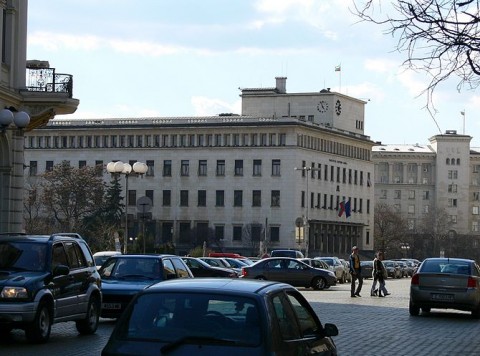By Frances Kopolla, Forbes
.

So now we know what lies beneath the recent Bulgarian bank runs. Fraud.
The Bulgaria National Bank (BNB) has conducted an audit on the books of both CorpBank and its recently-acquired Credit Agricole -Bulgaria subsidiary. According to BNB the subsidiary is sound, but CorpBank itself is anything but:
Findings of the Corporate Commercial Bank audit are, speaking mildly, actions incompatible with the law and best banking practices. Missing, and most likely to have been destroyed in the days before conservatorship, is a material credit record of a credit portfolio amounted to 3.5 billion lev out of a 5.4 billion lev total loan portfolio. A significant part of this portfolio shows a very high connectivity between debtors and majority shareholder Mr. Tsvetan Vassilev.
As a result of lack of information, the auditors express an opinion that they cannot evaluate the financial condition of the debtors’ ability to service their loans. The availability and quality of collateral also cannot be evaluated, which in turn makes it impossible to draw a final conclusion on the status of the loan portfolio amounting to 3.5 billion lev. Unfortunately, these actions cannot be registered with the tools of off-site bank supervision and are suggestive of intentional abuse.
These particular actions of officials in Corporate Commercial Bank are likely to amount to knowingly defrauding the bank of hundreds of millions lev. It is evident that the minority shareholders of Corporate Commercial Bank are also victims of these abuses.
For these reasons today BNB will bring the auditors’ report on the review of the assets and liabilities of the Corporate Commercial Bank to the attention of the Attorney General of the Republic of Bulgaria.
Because of the extent of the fraud, BNB say that nationalizing CorpBank is not an option – it describes it as “a bottomless barrel”. CorpBank will therefore be wound up. Its banking license will be revoked, and all “good” assets and liabilities will be transferred to its Credit Agricole-Bulgaria subsidiary, which will be nationalized. All deposits except those associated with majority shareholder Tsvetan Vassiliv will be guaranteed by the state.
According to Reuters, the Bulgarian Finance Ministry estimates that the cost of the deposit guarantee will raise the public deficit from 1.8% of gdp to 3%, putting it at the Maastricht treaty limit. This will be seen as a considerable disappointment in Brussels, which in the recent European Semester report advised the Bulgarian government not to allow the deficit to rise any further. And it raises considerable questions about the capability of the BNB to supervise banks effectively. Only a month ago CorpBank was given a clean bill of health. Now it is bankrupt because of a major fraud.
BNB is aware that its supervision in this case was inadequate. But it places the responsibility for this supervisory failure squarely on the shoulders of the unfortunate official (unnamed) who is Deputy Head of Banking Supervision. Everyone on the BNB board is exonerated. This does not bode well for the future of bank supervision in Bulgaria.
BNB’s statement makes a specific accusation of fraud against Vassilev in relation to the withdrawing of funds in advance of CorpBank’s failure:
Specifically – according to conservators – on June 19 this year, the day before the Corporate Commercial Bank was to be placed in special measures, a third party downloaded and delivered against receipt to the majority owner of Corporate Commercial Bank 205 887 223 BGN equivalent in cash, mostly Euro.
Reuters reports that in connection with this, the chair of CorpBank’s management board has been detained and an executive in the Treasury department has been charged with embezzlement. Lawyers for that executive, Margarita Petrova, ridicule the idea of anyone withdrawing 206 million lev in cash and claim that the accusation against her is a smokescreen to hide what they describe as BNB’s “bungling” of the case. They have a point: a cash transaction of that size would by any standards be an extraordinary event, simply because of the physical amount of cash involved. Surely someone would have noticed truckloads of lev and Euros leaving a bank in Sofia the day before the bank failed? Vassilev himself denies any wrongdoing and claims that there is a campaign to vilify him.
It all seems very murky. And for me, there are too many unanswered questions – particularly regarding the bank run itself. The bank run started when a major depositor, the businessman Delyan Peevski, removed his funds. Media reports at the time suggested it was because of a dispute with the bank’s major shareholder, Vassilev – who himself is now accused of robbing the bank the day before it was placed in conservatorship. Clearly, Peevski – as a depositor – cannot be accused of robbing the bank simply by removing his funds. But what I want to know is why he removed his funds at all. What information did he have that sparked his decision, and where did he get that information from? Did he know about the fraud? It is hard to see why he would have removed his funds unless he knew something very bad was going on. He must have been tipped off.
And there is another possibility, even murkier than that. What if Vassilev’s claim that this is all an orchestrated campaign to discredit him is actually true? What if this is not a straightforward case of fraud and corruption, but a complex piece of political game-playing by Bulgarian oligarchs, with the bank and its officials – and perhaps the BNB too – as pawns in the game? If this is what is really going on, then the stakes are very high indeed. The winner gets to control the Bulgarian financial system and probably its government too, and the losers end up in jail, exiled or dead. But maybe I’ve been watching too much “Game of Thrones”.
Whatever is going on, one thing is certain – the curious case of the Bulgarian bank runs is by no means solved. We now know that there was a massive fraud at CorpBank, but we still don’t know why there was a bank run. And we have no real idea what caused the bank run at First Investment Bank, either: all we know is that the BNB accused “persons unknown” of attempting to destabilize the banking system, presumably for political reasons, and some minor arrests were made. No doubt there will in due course be further investigation, and more announcements by the BNB. But will we ever know who is really behind all this, and what their purpose is?





